'Perfect storm' leads to dire situation for animal shelters in Jacksonville area and country
In Jacksonville and across the country, animal shelters have been full for months on end — frequently overcapacity — and begging for adoptions, foster families and donations.
The situation stems from a "perfect storm" of factors — some unexpected, such as ongoing staff and volunteer shortages and public-access limitations tied to the COVID-19 pandemic, and others expected, such as summer vacations that lead to decreased adoptions and the annual kitten season that brings a deluge of young cats.
Actual admission data doesn't tell the whole story: Based on intake numbers so far in 2022, the numbers of dogs and cats taken in at local shelters over the course of the year may be lower than 2021. But many of the animals are staying far longer than they would have in earlier years.
Digital fundraising: Jacksonville Humane Society doubles online donations, aided by training
Lifesaving University: Jacksonville Humane Society program puts them 'on another level'
"It's been a challenging year for a variety of reasons, everywhere in animal welfare," said Denise Deisler, CEO of the Jacksonville Humane Society, an independent nonprofit that currently shelters about 600 animals. "It's just an awful perfect storm."
Jennifer Walter, division chief at the city-run Animal Care and Protective Services, concurred.
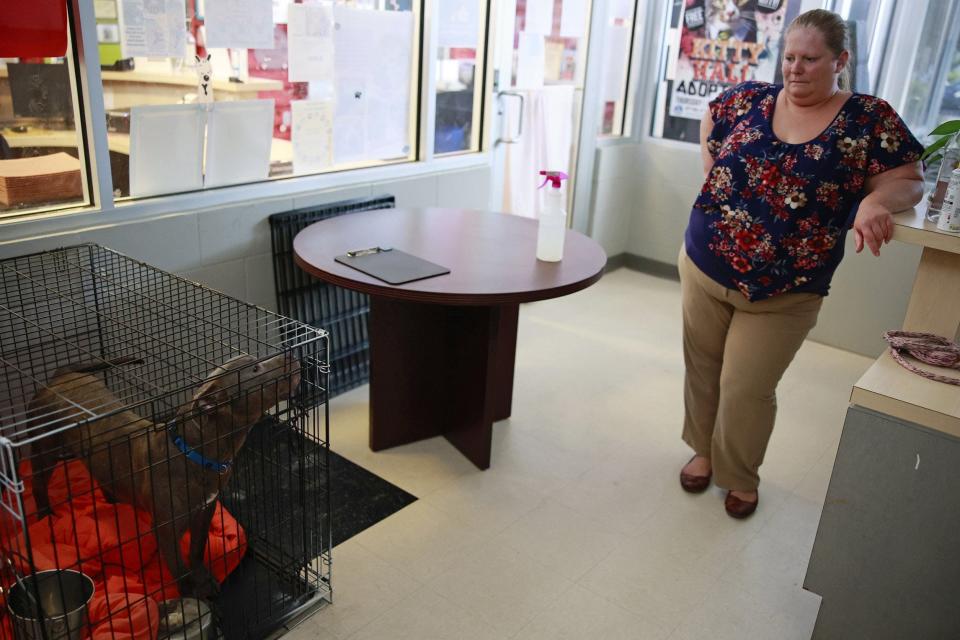
"The number of animals entering shelters is outpacing the number of animals leaving shelters," she said. "The reasons may vary from shelter to shelter based on geographical location or current challenges being faced by members of the individual community."
Nationwide more shelter animals put down in 2021
In Jacksonville another contributing factor is the shortage of affordable housing, Walter said.
"Housing insecurity impacts not only the number of households able to adopt, but also those able to foster," she said.
Even so, Jacksonville has maintained its overall no-kill status, which means at least 90% of dogs and cats leave shelters alive. The only animals put down are those with irreversible illnesses or behavioral problems. The rate briefly dropped to 89% because of a dog-fighting case but is expected to be 90% or above for the year.
But that is not the case nationwide, according to Tiffany Deaton, East Region senior strategist for Best Friends Animal Society, a Utah-based animal welfare organization.
"We are seeing trends that animal shelters' intake numbers have increased to the levels that they had experienced before the pandemic," she said. "However, the positive outcomes for those animals are not keeping the same pace. This challenge has been noted on a national level, and Florida shelters are experiencing the same issue."
In 2021, for the first time in five years, the number of dogs and cats killed in U.S. shelters increased — from 347,000 to 355,000, according to Best Friends. About 50% of the overall number of dogs and cats killed in 2021 were in Florida, Alabama, California, North Carolina and Texas.
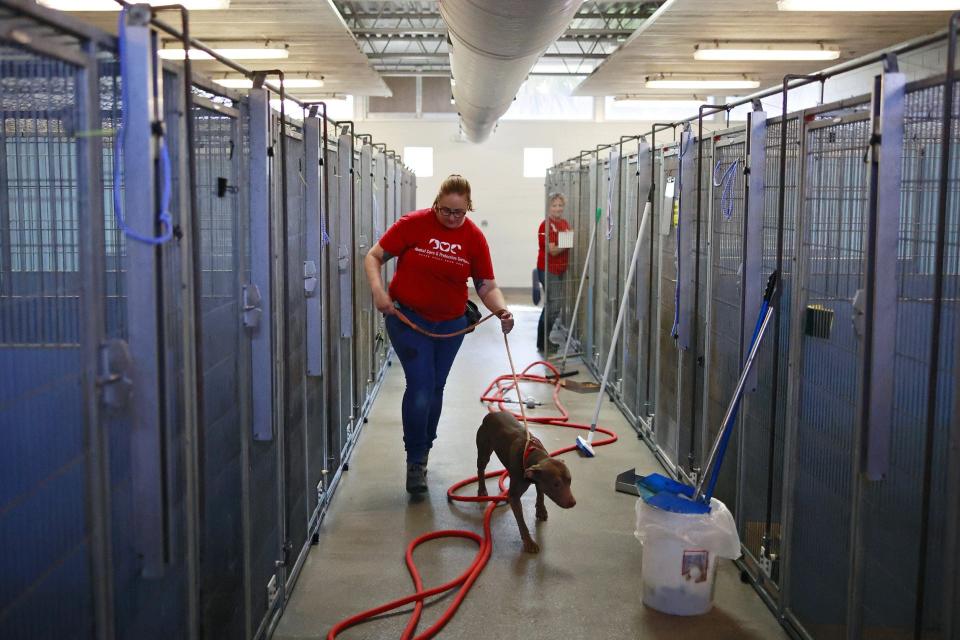
Still, though intake increased 8.1%, the number of dogs and cats killed increased by just 2.3%, according to Best Friends. The national save rate for dogs and cats in shelters is 83%: the number has dropped 77% since 2017 when Best Friends started tracking the data.
'Loosely organized chaos': Founder of Jacksonville animal-rescue group joins Ukraine pet effort
Celestial Farms:Home to 200 horses, cows, pigs and more, Jacksonville animal sanctuary facing financial crisis
As shelters reopened that year after pandemic-related closures, "so did the number of pets entering their facilities," Best Friends CEO Julie Castle said. "Over the course of 2021, shelters saw an 8.1% increase in intake, and sadly the number of pet adoptions could not keep pace with the increased intake."
The reasons are plenty
Like Deisler, Deaton said a "multitude of factors" are at play, including pandemic impacts.
"Currently there are considerably more pets at-risk of being killed in shelters than at this time last year due to recent problems such as staffing shortages, limited shelter hours, decreased volunteers and reduced adoption events," she said.
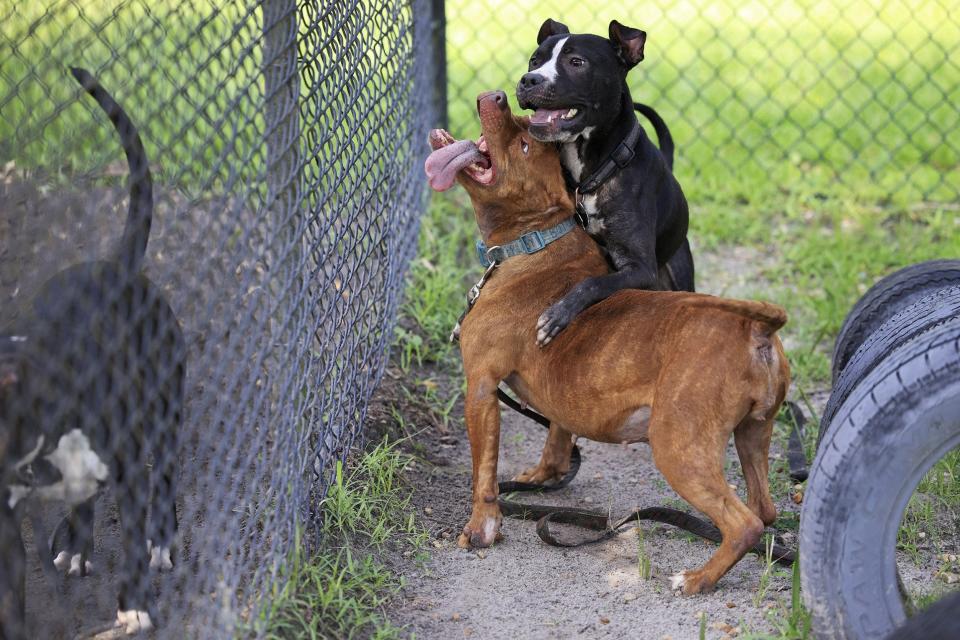
"Trying to balance the pre-pandemic levels of animals with significantly less staff than normal is making things harder for those employees who are doing the best they can for the animals," Deaton said. "Another factor is that some organizations continue to have COVID [public access] policies in place, which can limit adoption events and other avenues for animals to be adopted beyond the shelter setting."
Last July, staffing shortages prompted the Humane Society to close its veterinary hospital to the public — and it remains closed.
Veterinary staff shortage hits:Jacksonville Humane Society temporarily closes hospital to public
But the society is providing veterinary services to the community in other ways, through mobile clinics targeting areas where there is a lack of service and providing "charitable care to pets in crisis" through its Pet Help Center, said Lindsay Layendecker, director of community partnerships.
"We are still serving the public, it just looks different from before," she said.
Then came summer.
The summer months are "always the toughest," Deisler said. The primary culprit is kitten season, which begins every April or May and lasts through the fall as warmer weather brings more feline births, but summer vacations also play a role.
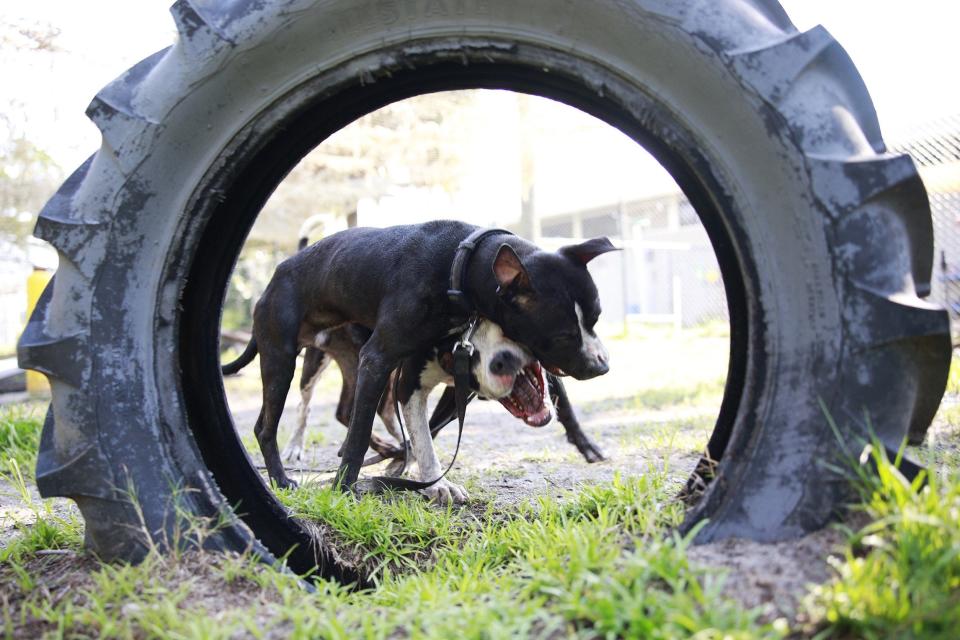
And this summer was worse because many families who canceled vacations during the worst of the pandemic took them this year, which means fewer of them were thinking about adopting, fostering or volunteering.
"People are busting loose," Deisler said. "We have not settled back to the 'new normal.'"
County-run shelters in Clay and Putnam reported similar conditions.
The Clay shelter has been at capacity since early May, Animal Services Director Ernest Hagen said.
"Summer is a busy season for animal shelters because they tend to take in a large number of cats and dogs this time of year," he said. "Clay County is growing, as most of the surrounding areas are, and by default, with a population increase, we are seeing an increase in pets coming into the area."
Looking for 'ever-loving homes': Nearly 4,000 beagles bred for drug experiments rescued
Evolution in action: There's a reason humans melt when they see 'puppy dog eyes,' new research reveals
Kathy Tillman, Putnam's shelter manager, added a few other factors. "Current state of the economy, post-COVID-19, increasing prices versus stagnant wages …," she said.
She also blamed "irresponsible pet owners" for adding to shelter populations by not spaying and neutering their pets, not adequately containing them and not reclaiming them when they end up impounded by Animal Services.
Community partnerships at work
What can shelters to do lessen their dog and cat populations?
Best Friends' Deaton said they should consider a "strategic intake plan" to control the flow of animals coming into the shelter based on capacity, kennel space, staffing and animals' medical or behavioral conditions.
Jacksonville's city-owned shelter on Aug. 16 chose that route, which was also recommended by the National Animal Care and Control Association. The shelter temporarily required appointments for non-emergency situations: Walk-ins and unscheduled surrender of animals were halted and anyone who finds a lost pet should contact the shelter before showing up.
"This temporary change is necessary to allow our staff to focus on urgent and critical situations and to provide better service to the community," Walter said. "It will also allow staff to identify and prepare a location in the shelter for the animal to be housed if shelter admission is determined to be the best option."
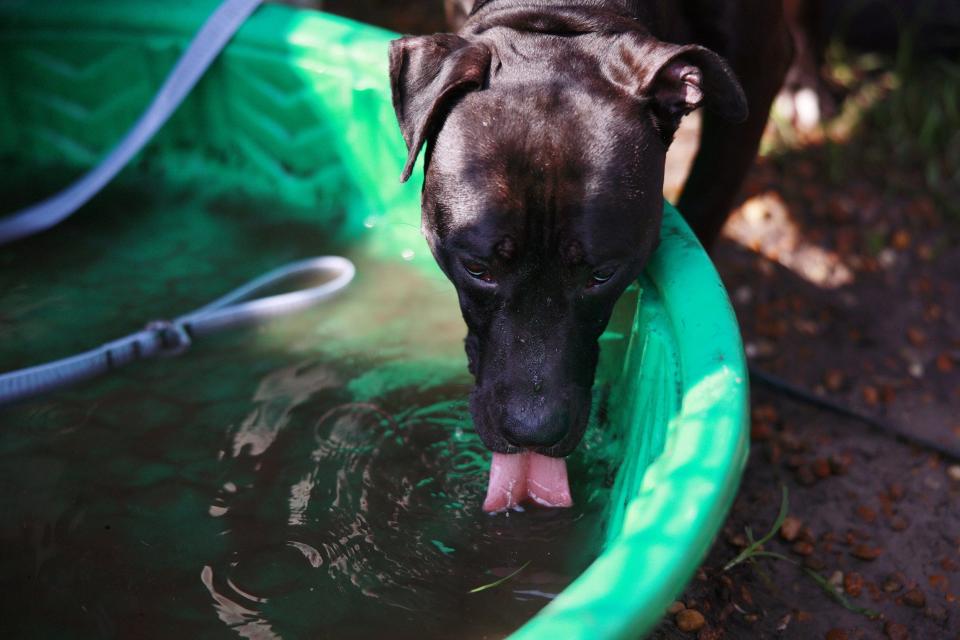
The appointment mandate is expected to remain in place through Nov. 30 "to coincide with hurricane season and peak intake months, or until the shelter population is better aligned with the capacity for care," Walter said.
Area shelters are also tackling the crisis by working with existing foster families, rescue organizations and other shelters and holding frequent adoption events at off-site locations such as PetSmart.
"Shelters that partner with other animal rescue groups and human services organizations have the most success because it maximizes the offerings available to keep a pet with their family," Deaton said. "It’s a large component of the strategic intake model because, at the end of the day, the best option for pets is to stay with their families, if that can be a possibility."
The Clay shelter provides layers of support for foster families and pet owners who are struggling, Hagen said.
Where to board Fido? Jacksonville has many options, asking the right questions essential
"The shelter … has a strong foster program in place where residents can be long-term foster families until the animals can find a forever home," he said. "All medical care is provided through Animal Services at no cost."
That program has helped the county maintain its no-kill status.
"Our shelter staff also provides the tools and resources families need to help keep their pets in their homes, as opposed to surrendering them to a shelter or abandoning them," Hagen said. Those tools include low-cost veterinary services, help with behavioral problems and information on rehoming information and pet-friendly housing.
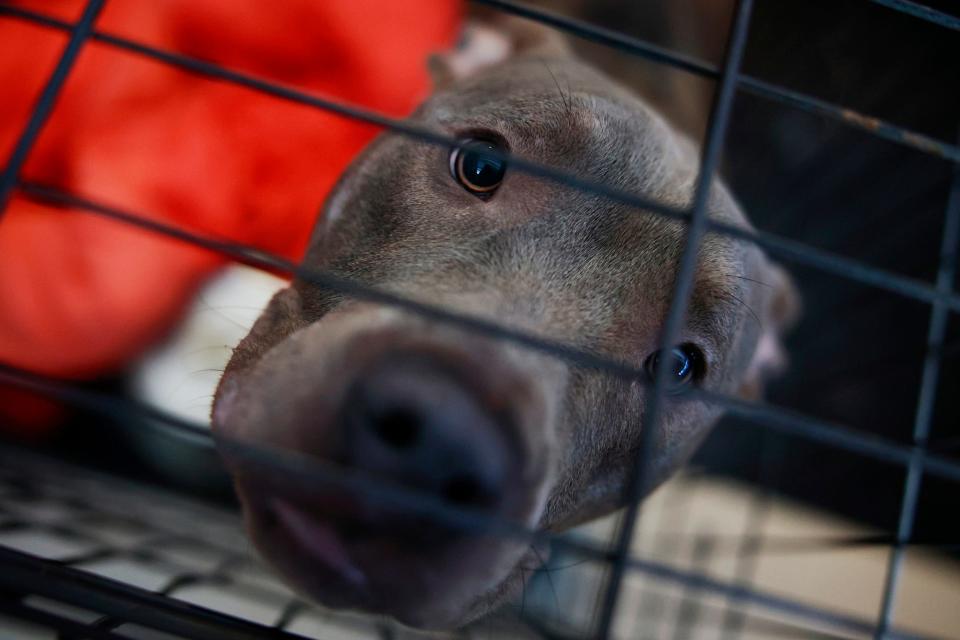
The Jacksonville shelter has similar programs: The Pet Safety Net provides pet food, care supplies, temporary boarding and counseling for behavior or training concerns. Also, animal code enforcement officers' first priority on "found pet calls" is reunification with the family. They scan found pets for microchips, knock on neighborhood doors and post information on social media sites.
Another program works to "convert finders to fosters," Walter said. "If a person in our community finds a pet and is willing to foster until the owner is located, we empower them to do so by providing basic supplies that may be needed."
Hagen said he hopes that a historical trend — the Clay kennel population tends to drop in October or November through March — returns this year. Deaton agreed.
"If that is the case this year, it will be a great opportunity for animal shelters to review their operations and find opportunities to expedite intake and holding periods to get animals into adoptive homes," she said. Deaton also suggested they consider reducing some adoption requirements "that may cause a bottleneck when they have too many animals in their care during busy months."
Whether shelter admissions decline or not, Putnam's Tillman said she will stay the course.
"I keep doing what I'm doing because someone has to care for them," she said, "Regardless of the outcome, they are worth it."
bcravey@jacksonville.com, (904) 359-4109
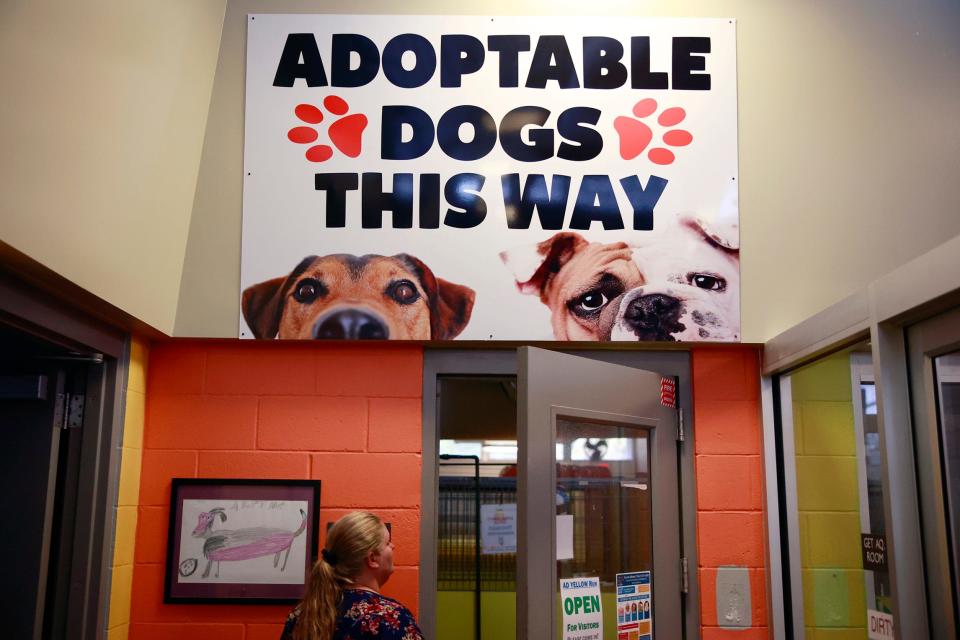
SHELTER ADMISSIONS
• Clay County Animal Services
Oct. 1, 2021-Aug. 9 2022: 2,604 animals
2020-Aug. 9. 2021: 2,858 animals
• Jacksonville Animal Care and Protective Services
Oct. 1, 2020-Sept. 30, 2021: 7,693
Oct. 1, 2021-Aug. 10, 2022: 5,965
• Jacksonville Humane Society
Jan. 1, 2020-Dec. 31, 2021: 8,197
Jan. 1, 2021-July 2022: 4,951
Note: Data not available for Putnam County
MAJOR NORTHEAST FLORIDA ANIMAL SHELTERS
• Clay County Animal Services, 3984 W. Florida 16, Green Cove Springs. (904) 269-6342, clayadoptions@claycountygov.com, claycountygov.com/community/animal-services.
• Jacksonville Animal Care and Protective Services, 2020 Forest St. (904) 630-2489, jaxpets@coj.net, coj.net/pets.
• St. Johns County Pet Center, 130 N. Stratton Road, St. Augustine. (904) 209-6190, co.st-johns.fl.us/animalcontrol/petcenter.aspx.
• Nassau County Animal Services, 86078 License Road, Fernandina Beach. (904) 530-6150, nassaucountyfl.com/845/Animal-Services or facebook.com/NassauCountyAnimalServices.
• Putnam County Animal Services, 174 County Landfill Road, Palatka. (386) 329-0396 option #1, bit.ly/2EKoICq.
For more information about Best Friends Animal Society, call (435) 644-2001 or (435) 688-2327, email info@bestfriends.org or go to bestfriends.org.
This article originally appeared on Florida Times-Union: Jacksonville animal shelters full, in dire need of adoptions and help

